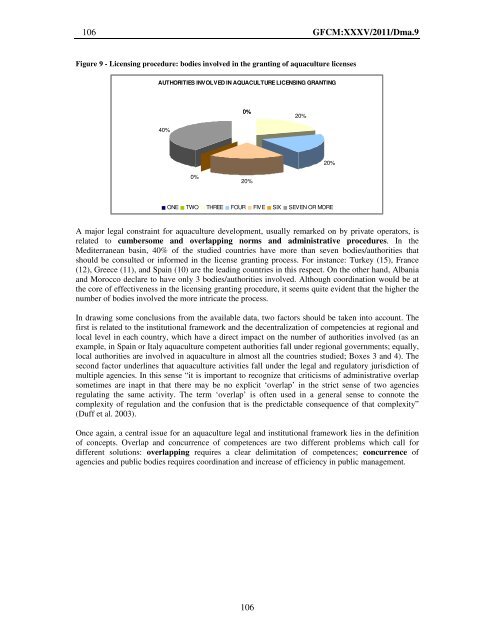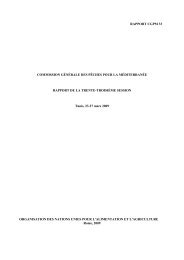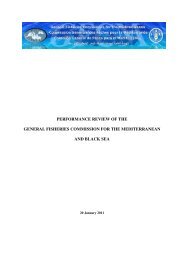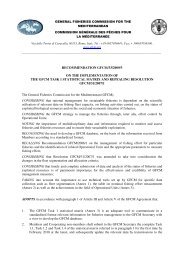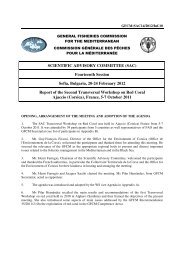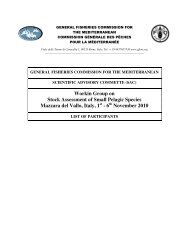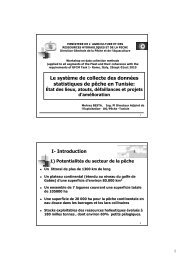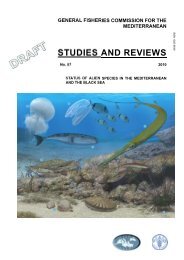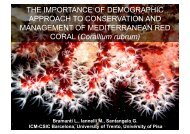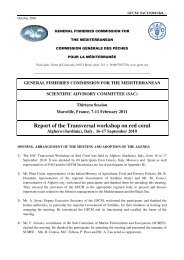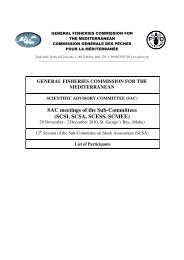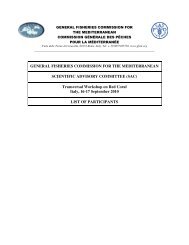Site selection and carrying capacity in Mediterranean ... - FAO Sipam
Site selection and carrying capacity in Mediterranean ... - FAO Sipam
Site selection and carrying capacity in Mediterranean ... - FAO Sipam
Create successful ePaper yourself
Turn your PDF publications into a flip-book with our unique Google optimized e-Paper software.
106 GFCM:XXXV/2011/Dma.9<br />
Figure 9 - Licens<strong>in</strong>g procedure: bodies <strong>in</strong>volved <strong>in</strong> the grant<strong>in</strong>g of aquaculture licenses<br />
AUTHORITIES INVOLVED IN AQUACULTURE LICENSING GRANTING<br />
40%<br />
0%<br />
0%<br />
20%<br />
A major legal constra<strong>in</strong>t for aquaculture development, usually remarked on by private operators, is<br />
related to cumbersome <strong>and</strong> overlapp<strong>in</strong>g norms <strong>and</strong> adm<strong>in</strong>istrative procedures. In the<br />
<strong>Mediterranean</strong> bas<strong>in</strong>, 40% of the studied countries have more than seven bodies/authorities that<br />
should be consulted or <strong>in</strong>formed <strong>in</strong> the license grant<strong>in</strong>g process. For <strong>in</strong>stance: Turkey (15), France<br />
(12), Greece (11), <strong>and</strong> Spa<strong>in</strong> (10) are the lead<strong>in</strong>g countries <strong>in</strong> this respect. On the other h<strong>and</strong>, Albania<br />
<strong>and</strong> Morocco declare to have only 3 bodies/authorities <strong>in</strong>volved. Although coord<strong>in</strong>ation would be at<br />
the core of effectiveness <strong>in</strong> the licens<strong>in</strong>g grant<strong>in</strong>g procedure, it seems quite evident that the higher the<br />
number of bodies <strong>in</strong>volved the more <strong>in</strong>tricate the process.<br />
In draw<strong>in</strong>g some conclusions from the available data, two factors should be taken <strong>in</strong>to account. The<br />
first is related to the <strong>in</strong>stitutional framework <strong>and</strong> the decentralization of competencies at regional <strong>and</strong><br />
local level <strong>in</strong> each country, which have a direct impact on the number of authorities <strong>in</strong>volved (as an<br />
example, <strong>in</strong> Spa<strong>in</strong> or Italy aquaculture competent authorities fall under regional governments; equally,<br />
local authorities are <strong>in</strong>volved <strong>in</strong> aquaculture <strong>in</strong> almost all the countries studied; Boxes 3 <strong>and</strong> 4). The<br />
second factor underl<strong>in</strong>es that aquaculture activities fall under the legal <strong>and</strong> regulatory jurisdiction of<br />
multiple agencies. In this sense “it is important to recognize that criticisms of adm<strong>in</strong>istrative overlap<br />
sometimes are <strong>in</strong>apt <strong>in</strong> that there may be no explicit ‘overlap’ <strong>in</strong> the strict sense of two agencies<br />
regulat<strong>in</strong>g the same activity. The term ‘overlap’ is often used <strong>in</strong> a general sense to connote the<br />
complexity of regulation <strong>and</strong> the confusion that is the predictable consequence of that complexity”<br />
(Duff et al. 2003).<br />
Once aga<strong>in</strong>, a central issue for an aquaculture legal <strong>and</strong> <strong>in</strong>stitutional framework lies <strong>in</strong> the def<strong>in</strong>ition<br />
of concepts. Overlap <strong>and</strong> concurrence of competences are two different problems which call for<br />
different solutions: overlapp<strong>in</strong>g requires a clear delimitation of competences; concurrence of<br />
agencies <strong>and</strong> public bodies requires coord<strong>in</strong>ation <strong>and</strong> <strong>in</strong>crease of efficiency <strong>in</strong> public management.<br />
106<br />
20%<br />
20%<br />
ONE TWO THREE FOUR FIVE SIX SEVEN OR MORE


